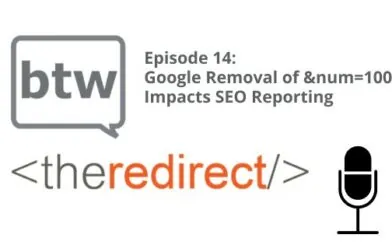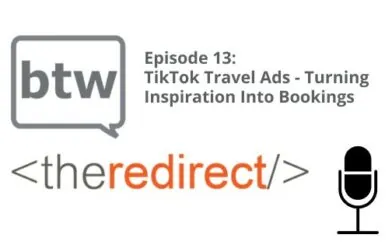AI continues to be the hottest buzzword in Marketing right now. Every week, a new ‘expert’ pops up promising you shortcuts to guaranteed rankings in ChatGPT or other AI-driven platforms. Sound familiar?
In this episode of The Redirect, our host Jason Dodge shares the mic with special guest Nick LeRoy, SEO consultant and author of the SEO For Lunch newsletter, to cut through much of the hype. Over the years there have been many shiny promises come and go in our industry, and Nick is quick to call out the newest wave of too-good-to-be-true pitches.
Tap into the podcast below or brief the actionable show notes as Jason and Nick explore what AI can realistically do for your brand, the red flags to watch out for, and how to harness AI as a tool without falling for scams.
The Problem with AI “Guarantees”
Marketers have seen this play before. Just like the early days of SEO, self-proclaimed experts are now selling shortcuts — “We’ll get you #1 in ChatGPT,” “We guarantee visibility in AI Overviews.”
Nick’s take is blunt: if someone is promising results without explaining how, it’s snake oil.
“If some self-proclaimed expert tries to guarantee your placement at the top of ChatGPT, run. Fast.” — Nick LeRoy
The red flags to watch for:
- Overuse of jargon like “vector embeddings” without real explanations
- Lack of transparency about process or measurement
- Any “guarantee” of top rankings in AI-generated results
Why “AI Expert” Doesn’t Mean Anything
In an unregulated industry, it’s easy to slap “AI expert” on a LinkedIn headline. But as Nick points out, expertise in digital marketing is fleeting.
Algorithms shift, platforms evolve, and the “rules” change faster than anyone can keep up. What matters isn’t claiming mastery — it’s adaptability.
“I despise the term ‘expert’ in digital marketing. The second you think you’ve mastered it, the rules change.” — Nick LeRoy
AI: A Tool, Not a Silver Bullet
The appeal of AI is obvious: businesses want the “easy button.” Automate work, cut costs, scale output. But believing AI is a replacement for people leads to unrealistic expectations.
Nick reframes it: AI doesn’t replace smart marketers — it scales them.
Jason drove the point home with a reality check:
“There’s no silver bullet with AI — you still have to test, refine, and improve, just like any other marketing tactic.” — Jason Dodge
Garbage In, Garbage Out
AI isn’t magic. It’s still driven by inputs. Poor prompts lead to poor outputs — the same “garbage in, garbage out” rule marketers have always lived by.
Nick compared it to teaching a child: AI learns and improves through feedback loops, not one-time commands.
Jason echoed the concern:
“It’s still garbage in, garbage out. Just because AI is involved doesn’t make bad inputs magically turn into good outputs.” — Jason Dodge
Rethinking Success Metrics
Perhaps the biggest trap with AI optimization is how success is measured.
Right now, many “AI solutions” point to impressions as proof of impact. But impressions don’t equal performance. They don’t show conversions, revenue, or long-term brand lift.
Nick challenges businesses to ask: is this performance marketing, or brand marketing?
Jason agreed and emphasized a broader view:
“Many attribution models are broken. They rarely favor organic, and they don’t tell the whole story when it comes to AI’s impact.” — Jason Dodge
The smarter approach is to measure overall brand visibility — across platforms like Google, Reddit, YouTube, and AI Overviews — not just one metric in isolation.
What Businesses Should Do Right Now
Nick’s advice is clear: make sure your partners are experimenting with AI.
If your agency or consultants aren’t talking about AI at all, that’s a red flag. Sticking to old SOPs won’t cut it in a space that evolves weekly.
Actionable steps to take:
-
Audit the promises. If anyone guarantees AI rankings, walk away.
-
Push for adaptability. Work with partners who are testing, learning, and sharing results transparently.
-
Use AI as an amplifier. Let it scale good ideas, not replace people.
-
Improve your inputs. Better prompts and feedback loops = better outputs.
-
Redefine success. Don’t chase impressions — focus on meaningful visibility and brand growth.
- Be a skeptic. Don’t take the AI output at face value. Vet and validate the responses for accuracy.
AI isn’t the enemy. The problem is how it’s being sold, and perhaps as a shortcut, or a guarantee. The reality? AI is simply another tool in the marketer’s toolkit, and its value will depend on how thoughtfully it’s being used.
For your brand, the path forward is clear: stay curious, demand transparency, and don’t fall for promises that sound too good to be true.
If you’re curious about generative AI search and how it impacts your business, let’s connect. No buzzwords, no guarantees. Just an honest conversation. Schedule a time to talk.



